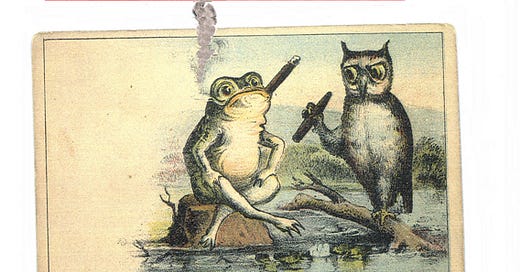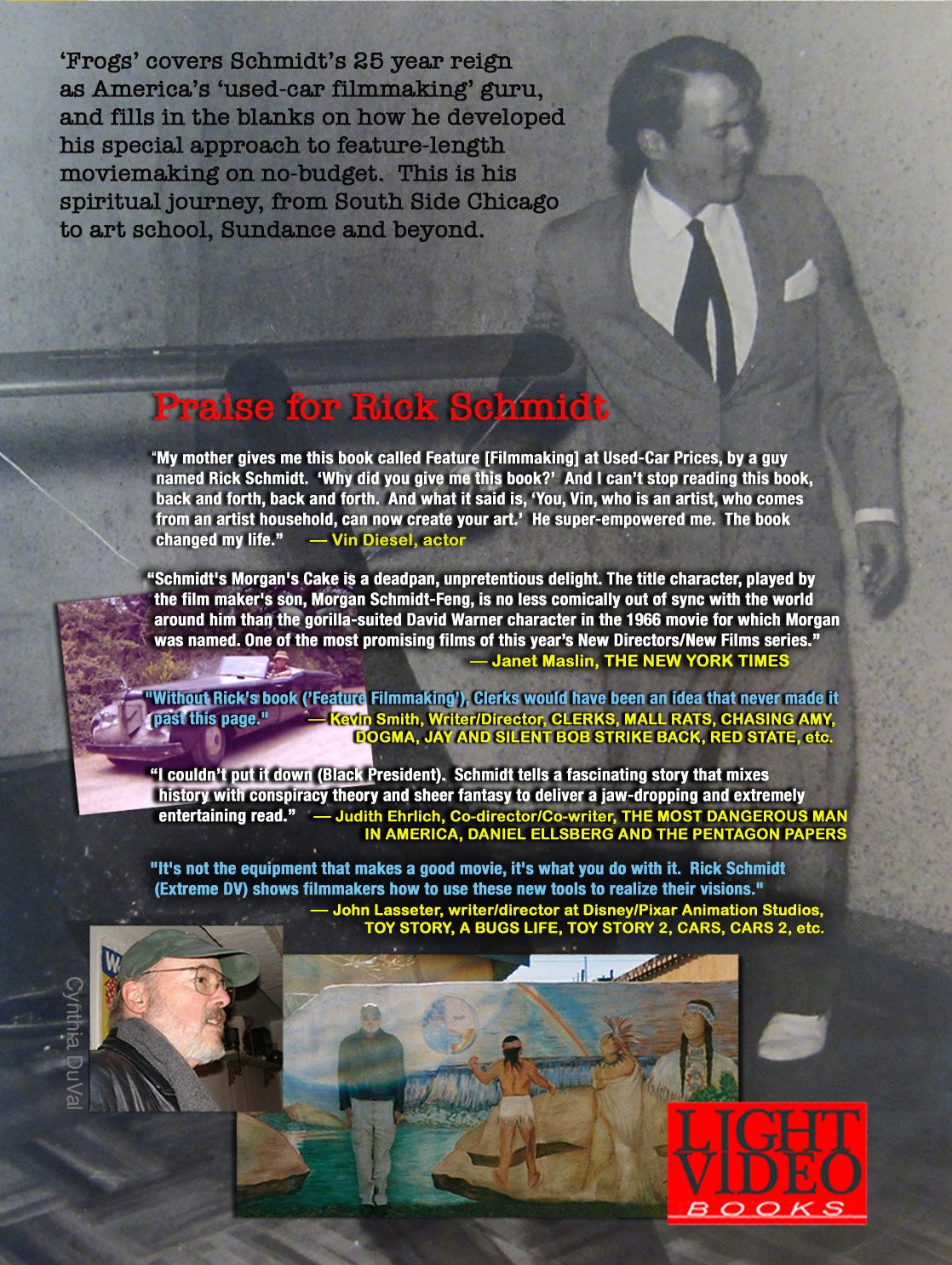Playing Dangerous Games.
“Always stay in your own movie.” – Ken Kesey******* https://www.amazon.com/Twelve-Frogs-Stories-Filmmakers-Memoir/dp/1389845451
Stories to follow are excerpted from “TWELVE DEAD FROGS AND OTHER STORIES––A Filmmaker's Memoir, by Rick Schmidt
—————
PAIN FROM THE MOTHER (1944)
When I told a half-Cherokee sculptor friend of mine in Oakland, Don Rich, that I had been born “breech,” arm and leg first, he said that I would have been considered a sage or shaman to Native American tribes, because I had ‘taken the pain from the mother.’ He said that since I had begun life with a life-or-death struggle, I would have earned the right to be treated specially by my tribe. We’ve all seen movies where Indians are dangled at the end of ropes threaded through their chests, conducting their self-imposed torture during the Sioux Sun Dance ceremony. I wonder how my birth stacked up against that level of pain. Somewhere, locked deep in my sub-consciousness, the memory of my birth still exists – prodding forceps clamping down, twisting and turning me, followed by extraction from my mother’s uterus into the harsh glare of an operating room. What was it really like?
BIRTH REENACTMENT (1944)
At seven months, I am floating around in my mother’s amniotic fluids, still head-up, nowhere near the correct position for normal birth, where the head descends, to lead the baby out the birth canal. Suddenly my mother’s body signals that she is having a premature birth and she is rushed to the hospital. Within minutes she is tranquilized into unconsciousness and rolled by gurney into a delivery room. Her doctor has been called off the golf course and dons his surgeon’s greens, washing his hands while joking with the nurse in attendance about ’the bogey on hole seven.’ Snap, snap, the rubber gloves are secured over his hands. Looking back for a second at the young nurse to laugh at her witty remark – something about how he’ll need to use a nine-iron to scoop me out – he enters the room.
As I’ve said, my young mother, age 28, is out cold. So, no chitchat is necessary, no bedside manner for the doctor to worry about. He goes to work, running his hands over her stomach like an auto body repairman sizing up the dent in a Chevy. Yes, there’s some work to be done here, he thinks to himself.
First, he makes an incision to open up the vagina as wide as possible (he needs some elbow room there), and goes in with the fingers. It doesn’t take long to confirm that my legs and an arm are down there, near the opening. Inside, I feel the invasion and try to retract my appendages away from the intruder. Finally, the probing stops and my heart beat returns to normal. Then comes the metal forceps. With great dexterity, the doctor eases the metal jaws into the birth canal and grabs hold of my leg. Ouch! I feel the pain and I contort, furiously kicking at the grip. But it won’t let go. Suddenly I’m being rotated, and there’s nothing I can do about it. Outside in the bright lights of the operating room, the doctor narrates his actions like he’s still out on the fairway – he says it helps both the deliveries and his golf score.
“Driving it home. Yep. Seeing the clubhouse up ahead now.”
Finally, the doctor has re-positioned my torso, pre- paring to drop my head into position. The vise-grip releases, temporarily. I recover, my jaw closing slightly as my silent scream abates.
Then a horrible sensation shocks my skull, as the metal monster latches on. My heart races spasmodically as the pain increases. I feel my face squashing in, eyes popping, ears flattened by the unforgiving claws. I’m dragged, down, down. The doctor, who is an all-around sportsman, now resorts to fishing terms more suited for the finale.
“Reeling in a big one–still got some fight, but think I can land ’em.”
My eyes are being squeezed together, forced open through their lids, but I’m still in darkness. Suddenly, at the threshold of pain I emerge, jerked out into the blinding light. The forceps are removed from the sides of my head and I cry furiously while nurses comment on my small size (5 pounds) and condition (black and blue).
As the doctor receives his well-deserved accolades, takes a bow or two, he can’t help recounting the landing of an 80-pounder off the shore of St. Johns the previous month. At any rate, I’m born alive, in Chicago, Illinois, during the latter part of WWII.
*****
For a Native American baby who experienced such a breech birth, encamped with his family somewhere on the plains (Illinois, Iowa, Nebraska?), he or she would have been at much greater risk of stillbirth. With no sterile environment, no monitoring devices, no incubator or modern medicines, what was his or her life expectancy?
When my mother awoke, she asked the nurse, “When am I going to have it?”
Years later, Mom told me that the delivering doctor had a big ego. He let her know that she’d been lucky to have had such a fine physician on-call (hole in one...), because her baby would surely have died if his abilities had been anything short of ’extraordinary.’ She said my father had been confident all along, believing that the birth would indeed be successful. His first marriage had ended disastrously in the 1930s, in a maternity ward somewhere in Europe where both wife and child had died from toxemia poisoning. Possibly his attitude of bravado was an attempt to break the jinx, fortify himself, just in case another horrible tragedy occurred.
DEAD RATTLER (1945)
When I was a year and a half old, we moved to a small house just outside of Phoenix, Arizona for the winter, sparing my father the harsh Chicago weather that exacerbated his pulmonary problems (symptoms of emphysema were forthcoming). My mother said that when I saw some kids my size approaching I became scared, wondering what they were. I thought the entire world was made up of just one small person (me), the rest parent-size.
Sand storms more than once gave our house a thorough dusting – fun cleanup for a housewife, mom said. And we were plagued with typical desert dwellers. To protect me from an infestation of scorpions, my father placed each foot of my crib into a bucket of water, but my mother said she did find one on the wall next to where I was sleeping.
One morning I was sitting alone in my sandbox in our desert back yard when a six-foot rattlesnake headed over. When it was a few feet from where I was playing, within striking distance, our trusty German Shepherd pounced on it and tore it apart. This was before TV, where every parent learns to be overly cautious from talk shows.
SENTENCES (1946)
I do think I remember saying my first word, “screwdriver,” at about age two-and-a-half, outside the front gate of my great-grandmother’s Victorian house in the Midwest. Of course, I can’t be sure. But my mind still holds an image of talking to some workman near the entrance to the property. It’s hard to determine if the stories we recount from our childhood are real, but I do seem to remember everyone being tremendously excited when I finally spoke. Given my poor reaction to the pressures and expectations of my father later in adolescence, it’s not surprising that I just stayed clammed up until I could spout complete sentences, perform like the other big people around me.
RED DEATH (1946)
My mother said that one of the biggest scares she had during my infancy was when I was around two-and- a-half years old. She found me vomiting red liquid, sitting there on the floor of the pantry. But I had discovered a jar of maraschino cherries stored in a low cabinet and had eaten half of the contents. It took a while, she said, to recover from finding her baby in a pool of blood.
A LITTLE INDIAN (1948)
It’s ironic that I could never ’sit like a little Indian’ at play-school, kindergarten or later (still can’t), given the ’Shaman’ aspect of my breech birth. Obviously, my joints were too traumatized during my difficult birth to allow the flexibility needed to sit cross-legged. I have a breech baby friend who has this same problem, so it’s probably not uncommon. At any rate, from the very first moments of school, I felt like an outsider. And it didn’t help that my eyes were crossed until the age of two, inadvertently giving me additional problems with school. While I believe that this disability helped me develop a high-level of visual perception and memory (as a filmmaker and editor I’ve come to understand and appreciate this about myself). Anyway, problems with focusing on words in books made reading a horrible and frustrating chore. This learning disability was probably responsible for my years of disappointing grades and allergy to school text books in general. It’s taken writing books to rewire that part of my brain that deals with such cognitive learning.
PLAYING DANGEROUS GAMES (1949)
At some point during pre-kindergarten playschool, my parents were brought in for a special meeting. The teachers had complained that I made up dangerous games in which all the other kids participated. My parents were asked if they could please talk to me about stopping this bad behavior. I guess they did, because I certainly didn’t try to exercise any form of leadership qualities for the next twenty-five years, until I began convincing people to jump off bridges to help me make movies.
—————






Loved this writing. The most intimate of all and still, of course, massively entertaining.
Great stories! I find myself playing with casting ideas for that doctor in the breech birth. Jack Nicholson? Bill Murray?